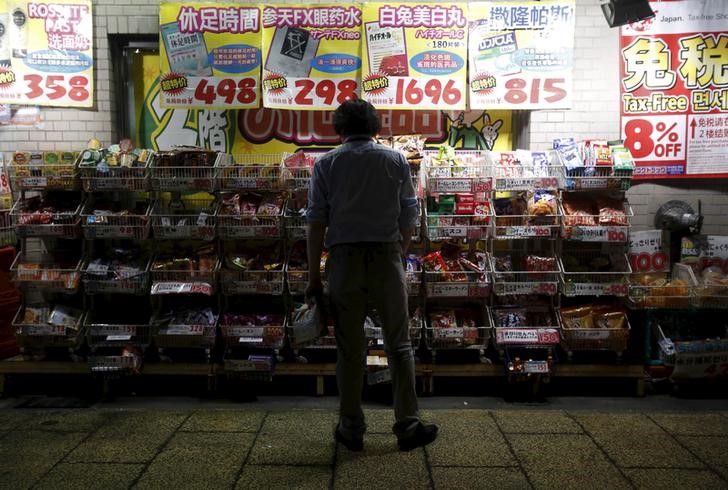By Stanley White
TOKYO (Reuters) - Japan's household spending rose in August for the first time in three months and the availability of jobs improved to its best in more than two decades, which could temper concerns that the economy has fallen into a recession.
The 2.9 percent annual increase in household spending in August was more than the median estimate for a 0.4 percent year-on-year increase and followed a 0.2 percent annual decline in July as consumers bought more cars.
A separate survey from the Bank of Japan showed corporate inflation expectations weakened slightly last quarter, which could bolster the argument that the central bank will ease monetary policy at the end of this month when it updates its long-term economic forecasts.
"Household spending and the tight labour market are a positive sign that the economy is chugging along," said Norio Miyagawa, senior economist at Mizuho Securities.
"I don't expect the BOJ ease when it meets next week. The BOJ is likely to lower its consumer price forecasts at the end of the month, so it faces a test of credibility if it doesn't ease policy then."
The gains in auto sales are particularly encouraging, because it suggests this category has finally recovered from a tax increase that triggered a slump in compact car sales, Miyagawa also said.
In addition to higher car sales, many consumers bought new domestic air conditioners during a spell of unusually hot weather, a government official said.
Government data showed the jobs-applicants ratio rose to 1.23 in August, which is the highest since January 1992. The jobless rate was 3.4 percent in August, slightly more than the median estimate of 3.3 percent.
Gains in household spending suggest financial market turmoil caused by China's slowing economy has done less damage to sentiment than initially feared.
The BOJ will hold a two-day meeting on Oct. 6-7, but many economists are focussed on the following meeting on Oct. 30, where the central bank will recalculate its consumer price and gross domestic product forecasts.
Japanese firms expect consumer prices will have risen an average 1.2 percent a year from now, the BOJ's September tankan showed on Friday.
That was less than a 1.4 percent annual increase expected in the previous survey, which suggests the BOJ may have to expand asset purchases again to meet its 2 percent inflation target.

Some economists are also calling for the government to launch a stimulus package after a surprise fall in August's industrial production increased the chance that the economy contracted in July-September, which would put it in recession.